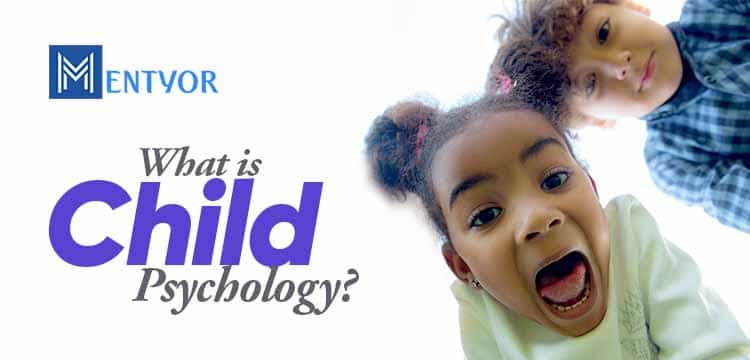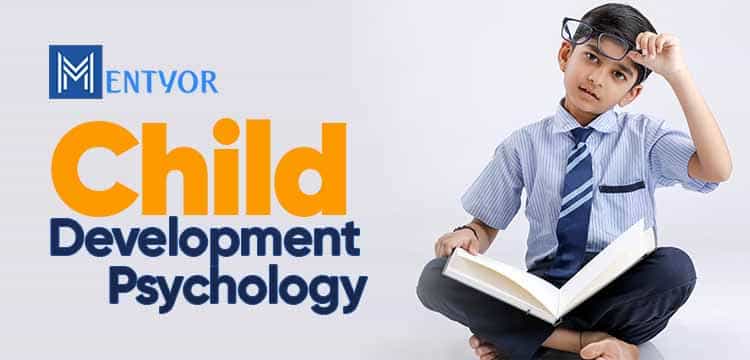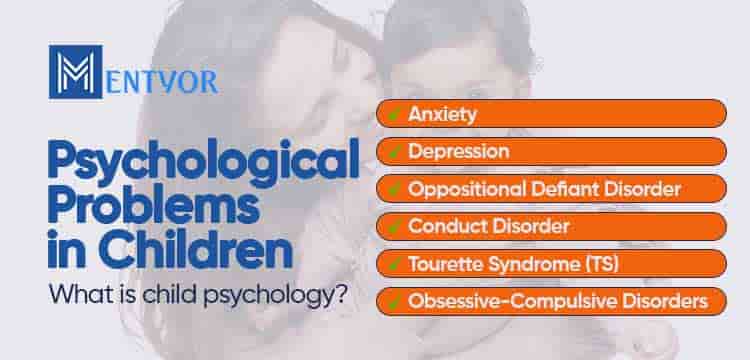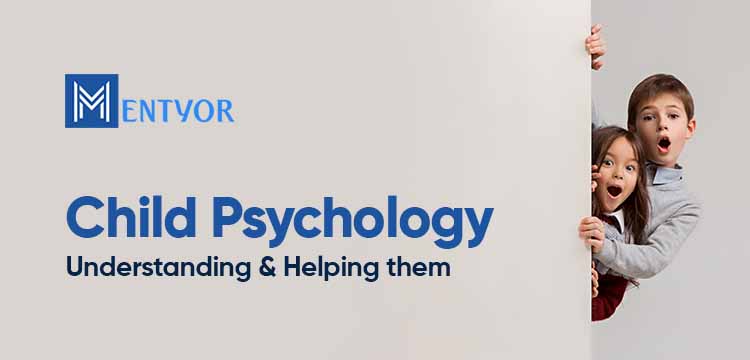Becoming acquainted with your child as they develop can be perhaps the most important portion of being a parent. Figuring out how your child sees the world, showing your child new abilities, and guiding them as they process enormous new sentiments and changes is all-important for being a parent, yet it’s difficult.
As your child develops, they go through progressive development stages, from birth into adulthood. Natural, hereditary, and social elements would all be able to influence a child’s development, and how rapidly they progress starting with one phase then onto the next. It’s hard for children to clarify what they’re going through, considerably less to break down their sentiments. That is the place where their brain science can assist with giving you significant data.

What is child psychology?
Child psychology is one of the many parts of psychology. This specific branch centres around the brain and conduct of children from pre-birth advancement through adolescence. It deals with how kids develop genuinely, yet with their psychological, enthusiastic, and social improvement too.
Experts vary in their reactions to a portion of the greater inquiries in child psychology, for example, regardless of whether early encounters matter more than later ones or whether nature or sustain assumes a larger part being developed.
Since youth assumes a particularly significant part throughout the remainder of life, it is little can’t help thinking about why this point has gotten a particularly significant one inside brain research, humanism, and instruction. Experts centre just around the many impacts that add to typical youngster improvement, yet additionally to different elements that may prompt mental issues during youth.
Check our blogs:
- Best University in Oklahoma City for 2022
- 50 Best Universities in Pennsylvania
- Washington University in St. Louis | 30 Best Universities in St. Louis
- 50 Best Universities in Korea
Child Development Psychology

Child Development Psychology centres around clarifying how children change and develop all through adolescence. Such hypotheses place on different parts of advancement including social, passionate, and intellectual development. The investigation of human improvement is a rich and shifted subject. We as a whole have individual involvement being developed, however, it is now and then hard to see how and why individuals develop, learn, and go about as they do. Beliefs of development give a structure to considering human development and learning.
How has our understanding changed?
Child development that happens from birth to adulthood was to a great extent overlooked all through quite a bit of mankind’s set of experiences. Children were frequently seen as little forms of grown-ups and little consideration was paid to the many progress in academic capacities, language utilization, and actual development that happen during youth and immaturity.
Interest in the field of child development, at last, started to arise from the get-go in the twentieth century, yet it would in general zero in on unusual conduct. In the end, specialists turned out to be progressively keen on different points including common child development just as the impacts on improvement.
How do we understand changes? | What is child psychology?
For what reason is it essential to concentrate on how children develop, learn and change? A comprehension of child development is fundamental since it permits us to completely see the value in the academic, passionate, physical, social, and instructive development that youngsters go through from birth and into early adulthood.
A portion of the significant speculations of child development is known as great hypotheses; they endeavour to depict each part of improvement, regularly utilizing a phased approach. Others are known as smaller than expected hypotheses; they rather centre just around a genuinely restricted part of improvement like intellectual or social development.
Numerous child development theories have been proposed by scholars and specialists. Later hypotheses state the formative phases of children and recognize the ordinary ages at which these development achievements occur.
Psychological Problems in Children | What is child psychology?

Mental disorders among children are portrayed as genuine changes in the manner they normally learn, act, or handle their feelings, which cause pain and issues overcoming the day.
Let us learn each problem in a detailed manner to understand the psychological problems in children.
Anxiety
Numerous children have fears and stresses and may feel dismal and miserable now and then. Solid apprehensions might show up on various occasions during development. For instance, little ones are exceptionally troubled about being hidden from their folks, regardless of whether they are protected and focused on.
Even though feelings of dread and stress are run of the mill in youngsters, relentless or outrageous types of dread and misery could be because of nervousness or despondency. Since the manifestations include musings and sentiments, they are now and again called internalizing disorders.
At the point when a child doesn’t grow out of the apprehensions and stresses that are commonplace in small children, or when there are such countless feelings of trepidation and stress that they intrude with school, home, or play exercises, the child might be determined to have anxiety.
Examples of different types of anxiety disorders include:
- Being exceptionally apprehensive when well hidden from guardians. (separation anxiety)
- Having severe fear about a certain thing or circumstance, such as dogs, going to the doctor etc. (phobias)
- Being extremely scared of school and different spots where there are individuals. (general anxiety)
- Being exceptionally stressed over the future and about awful things occurring. (general tension)
- Having rehashed scenes of abrupt, startling, extraordinary dread that accompany manifestations like a heart beating, experiencing difficulty breathing, or feeling mixed up, temperamental, or sweat-soaked. (alarm issue)
Anxiety might present as dread or stress, yet can likewise drive children touchy and crazy. Anxiety symptoms can likewise encompass difficult resting, just as actual indications like exhaustion, cerebral pains, or stomach-aches. Some restless children hush up about their concerns and, along these lines, the side effects can be missed. [ Child Psychological Problems ]
Read our blog : Importance of Yoga in Students life
Depression
Once in a while being sad or feeling miserable is a piece of each child’s life. Notwithstanding, few children feel sad or uninterested in things that they used to appreciate, or feel weak or sad in circumstances they can change. At the point when children feel constant trouble and sorrow, they might be determined to have depression.
Examples of behaviours frequently seen in children with depression include:
- Feeling miserable, sad, or irritable a lot of the time.
- Not having any desire to do or appreciate doing fun things.
- Showing changes in eating designs – eating significantly more or much not exactly expected.
- Showing changes in rest designs – dozing significantly more or much is not exactly typical.
- Showing changes in energy – being drained and drowsy or tense and anxious a tone of the time.
- Struggling to focus.
- Feeling useless, futile, or blameworthy.
- Showing self-injury and pointless conduct.
Outrageous depression can lead a child to contemplate self-destruction or plan for self-destruction. For grown-ups ages 10-24 years, self-destruction is among the main sources of death. A few children may not discuss their weak and miserable relations, and may not seem unhappy. Discouragement may likewise raise a child to cause a commotion or act unmotivated, causing others not to see that the child is discouraged or to mistakenly name the child as a trouble-maker or lazy.
Useful blog : What is Self Motivation | 10 Self motivation quotes
Oppositional Defiant Disorder | Child Psychological Problems
At the point when children carry on tirelessly so it causes significant issues at home, in school, or with peers, they might be determined to have Oppositional Defiant Disorder (ODD). ODD as a rule begins before 8 years old, yet no later than by around 12 years old. Youngsters with ODD are bound to act oppositional or insubordinate around individuals they know well, like relatives, an ordinary consideration supplier, or an instructor. Children with ODD show these practices more regularly than different kids at their age.
Examples of ODD behaviors include:
- Regularly being furious or losing one’s temper.
- Regularly contending with grown-ups or declining to consent to grown-ups’ principles or solicitations.
- Regularly angry or resentful.
- Intentionally irritating others or becoming irritated with others.
- Regularly faulting others for one’s mix-ups or bad conduct.
Conduct Disorder
It is diagnosed when children show a continuous example of resentment toward others, and genuine breaking of rules and accepted practices at home, in school, and with peers. This standard infringement might include violating the law and result in capture. Children with CD are bound to get harmed and may experience issues coexisting with peers.
Examples of CD behaviours include:
- Disrupting genuine norms, like fleeing, remaining out around evening time when advised not to, or playing hooky.
- Being forceful such that causes hurt, like harassing, battling, or being savage to creatures.
- Lying, taking, or harming others’ property intentionally.
Give a read : Homesickness Problems Tips For Students
Tourette Syndrome (TS) | Child Psychological Problems
It is a state of the sensory system. TS makes individuals have “tics”. Tics are abrupt twitches, developments, or sounds that individuals do over and again. Individuals who have tics can’t prevent their bodies from doing these things. For instance, an individual may continue to flicker again and again. Or on the other hand, an individual may make a snorting sound reluctantly.
Having tics is somewhat similar to having hiccups. Although you might not have any desire to hiccup, your body does it at any rate. Some of the time individuals can prevent themselves from doing specific tics for some time, however, it’s hard. In the end, the individual needs to do tic.
Symptoms of Tourette syndrome
The main symptoms of TS are tics. Indications typically start when a child is 5 to 10 years old. The principal side effects regularly are engine tics that happen in the head and neck region. Tics for the most part are more terrible during times that are upsetting or invigorating. They will in general further develop when an individual is quiet or centred around action. The kinds of tics and how frequently an individual has spasms changed much over the long run.
Even though the side effects may show up, vanish, and return, these conditions are considered constant. As a rule, tics decline during pre-adulthood and early adulthood and here and there disappear altogether. Nonetheless, many individuals with TS experience tics into adulthood and, sometimes, tics can turn out to be more terrible during adulthood.
Albeit the media regularly depict individuals with TS as automatically yelling out swear words (called coprolalia) or continually rehashing the expressions of others (called echolalia), these side effects are uncommon and are not needed for a determination of TS.
Types of Tics
Mainly there are 2 types of tics:
- Motor tics- It is the movements of the body. Say for example motor tics include blinking, shrugging the shoulders, or shaking an arm.
- Vocal tics- These are sounds that an individual makes with his or her voice. For instance, vocal tics include humming, clearing the throat, or yelling out a word or phrase.
Suggested blogs:
- 25 Best Books on Leadership for the Leader in You | Books Every Leader Must Read
- Best books on Kindle unlimited : 25 best books to read for free
Obsessive-Compulsive Disorders | Child Psychological Problems
A lot of children once in a while have contemplations that trouble them, and they may feel like they need to take care of those considerations, regardless of whether their activities don’t bode well. For instance, they may stress over having misfortune if they don’t wear a most loved garment. For certain children, the contemplations and the tendencies to play out specific activities endure, regardless of whether they attempt to overlook them or make them disappear.
Children might have an obsessive-compulsive disorder (OCD) when undesirable considerations, and the practices they believe they should do on account of the contemplations, happen often, take up a lot of time (more than an hour a day), meddle with their exercises, or make them exceptionally irritated. The thoughts are known as obsessions. The behaviours are known compulsions.
Examples of obsessive or compulsive behaviours include:
- Having undesirable thoughts, motivations, or pictures that happen again and again and which cause uneasiness or pain.
- Thinking or saying something again and again. (for instance, tallying, or rehashing words again and again quietly or so anyone can hear)
- Accomplishing something again and again. (for instance, hand-washing, putting in things in a particular request, or looking at the same things and over, similar to whether an entryway is locked)
- Accomplishing something again and again as per certain standards that should be followed precisely to make an obsession disappear.
Children do these behaviours since they incline that the practices will keep terrible things from occurring or will help them in general. In any case, the conduct isn’t ordinarily associated with a real risk of something awful occurring, or the conduct is outrageous, for example, washing hands on different occasions each hour.
Conclusion
The article discusses what is child psychology and the psychological problems faced by children of age 10-24. Hope this was helpful.


 WhatsApp
WhatsApp